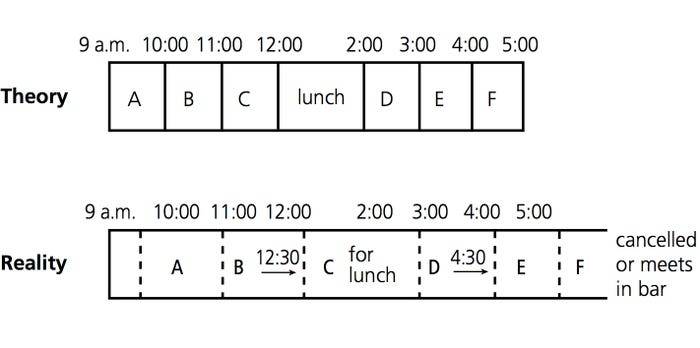Red time
Red time
The present reality is most important
As Richard Lewis puts it: "Priority is given to the relative thrill or significance of each meeting". The present reality is most important to them, they are flexible and less strict when it comes to planning and schedules.
The multi-active use of time
Just like the blue people, red has tasks that need to be done in today's time. To show how this will eventually be handled, we added the figure underneath. You can see the tasks (A until F) and the time blocks in which the tasks, in theory and in reality, will be handled.

Time can be stretched, tweaked, adjusted
As you can see, task A starts around 09:30 and ends around 11. B will be completed somewhere around 12.00 and 12.30. C will be handled around lunch and F might be cancelled or be handled in a bar. As you can see, to multi-reactive people, time is something that can be stretched, tweaked, adjusted.
Schedules and punctuality
As stated before, multi-actives do work with schedules, if only because linear active thinking has long been dominant in the management and business world. So they will at least pretend to observe agendas and schedules. But they feel the present reality, what happens right now, is more important than sticking to strict schedules or an exact order of things.
Multi-active: the more at the same time, the better
People from red cultures will not prefer to do one thing at a time. The contrary might be true. Doing more things at the same time makes them feel happier.
What is efficient?
People from blue cultures feel that they can only work efficiently if the do one thing at a time. Red people don't feel that way. They feel their own multi-active approach is more efficient. We see something here that we often can observe when observing different cultures. Both see their own 'normal' as 'the best way'. And it's good to realize that there are situations where doing one thing at a time are more efficient but also situations that the multi-active way of improvising and switching attention between tasks is more efficient. There is no one simple truth.
Differences blue-red-yellow
| Blue | RED | Yellow |
|---|---|---|
| Punctual, time-dominated | Relaxed about time | Harmonizes by doing things at appropriate times |
Follows linear agenda | Diverges frequently from agenda | Follows circular agenda |
| Has individual goals | Has intimate circle goals | Has company goals |
| Task-oriented | People-oriented | Very people-oriented |
| Does one thing at a time | Does several things at once | Focuses on doing things in the correct order |
| Plans ahead step-by-step | Plans grand outlines | Reacts to others' plans |
| Separates personal and business life | Intertwines business and social life | Links business and social life |
Need support?
- Mail us at support@spotonlearning.nl
- Use chat/mail to contact us
- Check the FAQ's
About us
Spot On Learning helps international organisations with international crews and teams learn faster.